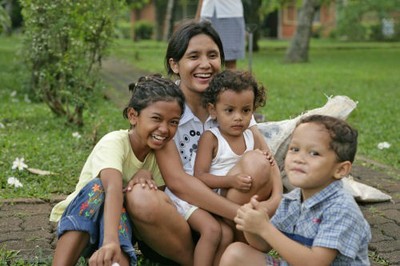Child Sponsorship Background from Jakarta, Indonesia
 SOS Children's Village Jakarta
SOS Children's Village Jakarta
SOS Children's Village Jakarta is situated at Cibubur, on the outskirts of Jakarta. Like many urban areas in developing countries, Jakarta has to cope with strong social problems, such as poverty, unemployment or homelessness.
When their families live under bad conditions, children often suffer most. SOS Children's Village Jakarta was built on a three-hectare site and officially opened in March 1984.
It consists of a number of Family Houses, the village director's house, an aunts' house (aunts are family helpers who support the SOS mothers), a community house, a garage with a workshop and an administrative and service area.
Well over 100 orphaned or abandoned children can find a new home there. The SOS Children's Village also has a library with a computer laboratory, a playground and a sports field where children can have fun. At the entrance to the SOS Children's Village, a traditional assembly hall was erected in 1993. This open hall, called a 'pendopo' in Indonesian, is used for all kinds of assemblies, parties, dancing and even sports events.
Other SOS Projects in Jakarta
There is also an SOS Nursery School, which is attended both by SOS children and by children from the neighbourhood. It offers day-care for up to 90 children. The older children attend private or state elementary and secondary schools.Adolescent boys usually move from the village to the youth facility when they start a vocational training course or go on to higher education.
With the support of qualified youth workers, the young people develop realistic perspectives for their future, learn to shoulder responsibility and increasingly make their own decisions. They are encouraged to develop team spirit and build up contacts with relatives and friends, as well as with the relevant authorities and potential employers.
The SOS Social Centre offers family strengthening, health counselling, community support, counselling and psychological support. The programmes are designed to ensure that children have access to essential services, such as education, health services and psycho-social support. Families are assisted with income generation. They also receive help when dealing with the authorities. People's parental skills and awareness of children's rights are improved.
Background to Jakarta
Jakarta is the capital and largest city of Indonesia with a greater population than any other city in Southeast Asia. Located on the northwest coast of Java Island,it has a population of nearly 8.5 million. Jakarta is the country's economic, cultural and political centre. Jakarta currently is the twelfth largest city in the world.
Like many big cities in developing countries, Jakarta suffers from major urbanisation problems. The population has risen sharply from 1.2 million in 1960 to 8.8 million in 2004, counting only its legal residents. The population of greater Jakarta is estimated at 23 million, making it the second largest urban area in the world. The rapid population growth has outgrown the government's ability to provide basic needs for its residents.

 Return to Schools Wikipedia Home page…
Return to Schools Wikipedia Home page…
